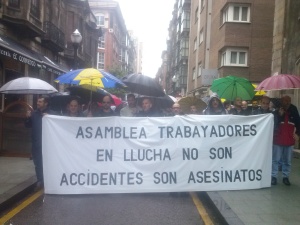
II Workshop
In The Same Boat: Shipbuilding and ship repair workers: a global labour history (1950-2010)”International Institute of Social History, Amsterdam
22-26 May 2013
P.O. Box 21
Program
May 22 (Wednesday)
Opening: IISH/Re-work/ Frits Loomeijer
Session 1 – 10:30h to 12:30h
Work, Workers and labour conflicts in the shipyard Bazán/Navantia, 1950-2010
José Gómez Alén (Fundación de Investigaciones Marxistas- Madrid)
Working Outside the Box: Shipbuilding, Shipbreaking, and Containterization in the United States, 1950-2000.
Robin Muhammad (Ohio University – USA)
Shipbuilding and ship repairs in Thailand during neoliberalism transition
Nicola Mocci (University of Cagliari –Thailand)
Lunch time (at IISH) – 12:30 to 13:30
Session 2 – 13:30h to 15:30h
The Situation of the “Bremer Vulkan” in the 1980s: an Example of the West German Shipbuilding Industry in the Second Half of the 20th Century.
Johanna Wolf (University of Leipzig)
The Development and Re-organization of Industrial Structures of the shipbuilding in Postwar Japan: A General Outline Takeshi Haragucho (Kobe University – Japan)
Evolution and development of Shipbuilding Industry in Maharashtra (India) from 1970s: Employer, Employee and Production perspective” S.M. Fahimuddin Pasha (Assistant Manager in Computer Society of India – India)
Coffee Break – 15:30 to 15:45
Session 3 – 15:45 to 17:45
The evolution of labor relations in Korean shipbuilding industry: A case study on the Hanjin Heavy Industries, 1950-2010 Wonchul Shin (Associate Professor Pusan National University Busan – South Korea)
An Overview of Labour in the British Shipbuilding and Ship repairing Industries in the Twentieth Century’
Hugh Murphy (Visiting Reader in Maritime History, National Maritime Museum, Greenwich – Great Britain)
Production and workers between tradition and innovation: Caneco and Rio Nave, two companies and one shipyard
Elina da Fonte Pessanha and Luísa Barbosa Pereira (Federal University of Brazil – Brazil)
Coffee Break – 17:45 to 18:00
Comments by Jan Lucassen 18:00 to 19:00
May 23 (Thursday)
Session 4 – 9:00 to 11:30
From boom to bust: Kockums 1950-1987
Tobias Karlsson (Lund University – Sweden )
Shipbuilding labour in Fincantieri
Valter Zanin (University of Padova – Italy)
Productive and organizational challenges of a State-owned enterprise. The case of Argentinean Shipyard Río Santiago
Juliana Frassa (University of La Plata – Argentine)
Forced Silence, Full Scale Fight, and Negotiated Peace: The Transition of Industrial Relations at the Hyundai Shipyard, 1972-2012
Jun Kim – National Assembly Research Service, Korea
Coffee Break – 11:30 to 11:45
Session 5 – 11:45h to 13:45h
The Norwegian shipbuilding industry 1950 – 2010: production systems, rationalization and labour relations
Hans-Jakob Ågotnes, Jan Heiret (University of Bergen-Norway)
Argentina shipbuilding industry: the State as problem and solution
Cintia Russo (Nacional University of Quilmes – Argentine)
Sestri Ponente shipyard. Workers, production and labour relations from 1950 until 2010
Giulia Strippoli, Davide Tabor, Luciano Villani (Italy)
Lunch time (at IISH) – 14:00 to 14:45
Session 6 – 14:45 to 6:45
Labour Force in Lisnave, Portugal: an overview Raquel Varela (IHC-Nova University of Lisbon / IISH)
Working in the Lenin Shipyard: Shipbuilding Industry in the People’s Republic of Poland in the 1970s and 1980s
Sara Graber (Centre for Contemporary History Potsdam – ZZF)
Shipowners and Politicians: Capital Accumulation and Labour Regime at the Desan Shipyard, Istanbul, Turkey (1991-2013) Asli Odman (Istanbul Health and Safety Labor Watch – Turkey)
From reparations to cruise ships. Productional changes and labour relations in the Turku shipyard, 1950-2010
Kari Teräs (University of Tampere – Finland )
Coffee Break – 17:00 to 17:15
Comments by Matthias Middell 17:15 to 18:30
May 24 (Friday)
Session 7– 9:00 to 11:00
French Saint-Nazaire’s shipyards from struggles of glorious postwar years to challenges of globalization age (1950-2010) Eric Kocher-Marboeuf
The Russian case – first results of an investigation
Matthias Middell – (CAS-University of Leipzig)
Shipbuilding industry in Portugal: Labour relations in Mitrena shipyard (1974-1995) Jorge Fontes (IHC- Nova University of Lisbon)
Coffee Break – 11:00 to 11:15
Session 8 – 11:15 to 13:15
Shipbuilding labour in China
Paula Nabuco (Fluminense Federal University – Brazil)
Against market rules. A shipyard nobody wanted (except workers) Ruben Vega Garcia (University of Oviedo – Spain)
Cockatoo Island, Australia – industry, labour and protest culture
Lisa Milner (Southern Cross University – Australia)
Lunch time – 13:15 to 14:00
Debates – 14:00 to 17:00
1- Debate on outlines of the second stage of the project: In the Same Boat? Shipbuilding and ship repair workers: a global labour history (1950-2010)
2- Define teams
Comments: Marcel Van der Linden
Coffee Break – 17:00 to 17:15
Workshop closure by Raquel Varela 17:15 to 18:30
Dinner in Amsterdam (offered by the IISH)
May 25 (Saturday)
10:00 – Excursion
6:00 – Drink at Boulevard Café http://www.boulevardcafe.nl
















